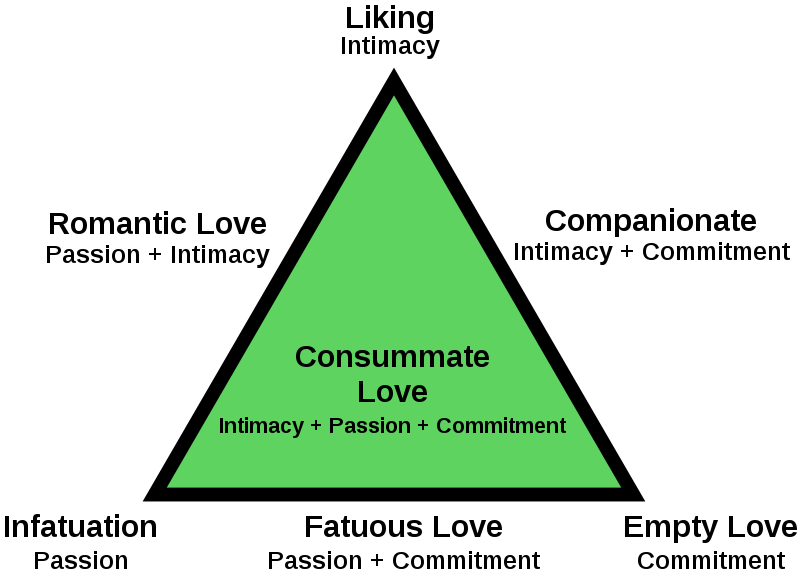I’m here today with a quick tidbit about types of love, philosophized by psychologist Robert Sternberg.
Sternberg is a researcher interested in psychometrics, or ways to gauge and analyze human psychology, and focused on human emotions of love and hate, as well as how to measure intelligence. In his triangular theory of love, Sternberg proposed that love can be comprised of three components: Passion, Intimacy, and Commitment.

Passion refers to emotional arousal, whether physical or mental, excitement, sexual and romantic interest, or other strong feelings that can aroused as a result of a partner or love interest. Passionate couples feel attraction for one another, interest, desire; passionate love is all about that hot, on-the-edge-of-your-seat feeling. It’s thought that this feeling diminishes over time as folks become more comfortable in their relationships.
Intimacy is defined as vulnerability, closeness, and attachment present in a relationship that determines the strength of a shared bond. Couples who experience intimacy describe it as a “warm” feeling or a close bond, with the ability to communicate and share emotional vulnerability.
Commitment here means the continued decision to turn toward a partner, to meet needs and promises and put a partner high on the priority list by providing loyalty and support, leading to a sense of attachment and relational satisfaction. Committed relationships are longer-standing in time, and this feeling generally increases with the length of the relationship. Commitment is sometimes described as “cold” love because it does not depend on other kinds of love to exist and grow.
Sternberg places these types of love as three points on a triangle that represent seven kinds of love.

Liking is intimacy absent of passion or commitment. This sort of love exists in friendships and other close bonds.
Empty Love is commitment only. This sort of love can evolve over time if a relationship loses passion and intimacy, or may exist early in a relationship like an arranged marriage and then branch out.
Infatuation describes love comprised solely of passion, indicative of early relationships, puppy love, and the “honeymoon phase.” This kind of love can appear and disappear suddenly.
Companionate Love describes a combination of intimacy and commitment that is present in long-term relationships where passion may fade or strong platonic friendships.
Fatuous Love is a stronger version of passion combined with commitment, characterized by a strong, quick bond and interest absent of commitment, as in a “whirlwind romance” or “love at first sight.”
Romantic Love is passionate and intimate absent of commitment, as in a passionate affair or one night stand.
Consummate Love is the culmination of love, representing an “ideal” relationship with all three types of love represented: commitment, passion, and intimacy. Attaining and representing this type of love is difficult and involves work, but is ultimately worth it in the end with regard to relationship satisfaction.

What does this mean for us? Having more insight into different types of love can help us to know more about how to usher in the sorts of love and relationships we would really like to have.
“Personal relationships that have the greatest longevity and satisfaction are those in which partners are constantly working on sustaining intimacy and reinforcing commitment to each other.“ – J. Rothwell